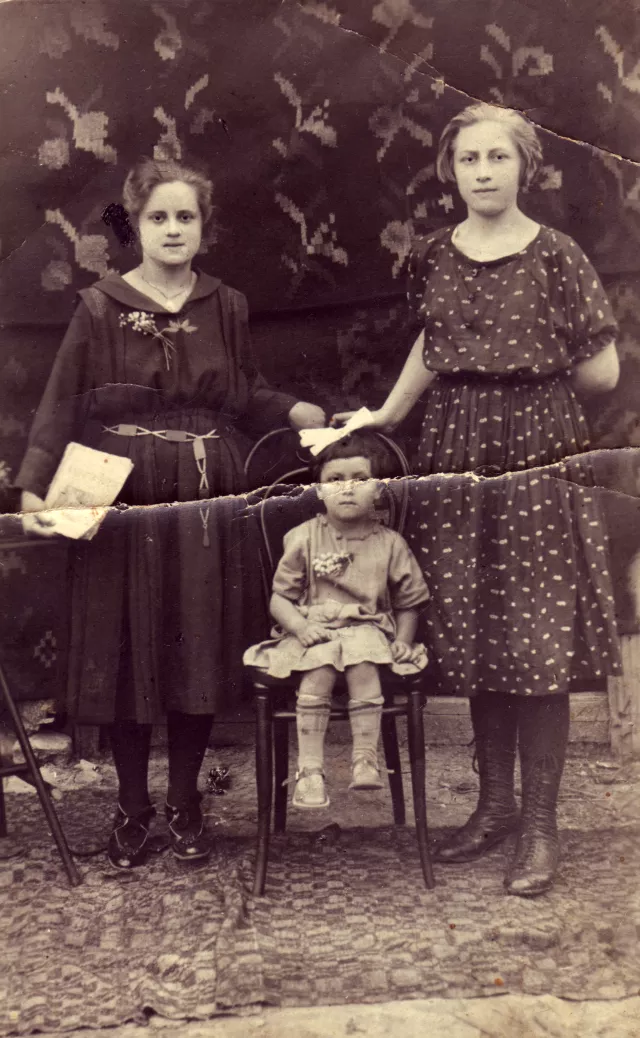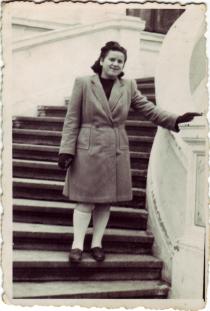Brana Mendelovici, Rifca Peisich and Hana Lea Calmanvici
The one in the left is my dear mother, Hana Lea Calmanovici, the one in the right is her sister, Brana Mendelovici – they were both maidens at the time –, and the one in the middle is their sister, Rifca Peisich. My aunt is 88 years old now. There was a significant age difference between them, as Rifca was conceived rather late.
My mother was born on March 3, 1903. People called my mother Anuta, but officially, her name was Hana Lea. My mother had 2 sisters who were younger than her. I know that she also had a brother, who died when he was little. I don’t even know what his name was, I don’t know anything about him.
Branica was one of my mother’s sisters, Brana Mendelovici – born Mattes, changed her name to Mendelovici after she married. Her husband’s name was Heinec Mendelovici, and they had 2 sons: Froim and Iancu. Froim was the same age as my younger sister, so he was born in 1937, and Iancu was a few years younger, I think he was born in 1940. They lived in Frumusica, my aunt married a man from Frumusica – near Sulita. [Frumusica is located 27 km south of Sulita, 39 km south-east of Botosani.] My uncle was a merchant as well, he too had a manufacture store, he sold shoes in Frumusica. [When they came] In Botosani, they probably had gold coins, I couldn’t say for sure, I don’t know about that, they kept it a secret from me, and they bought sheep, they kept them close to Botosani. And he was more well-off than us, and he helped us. My mother’s sister, Branica, died in 1946, and after that my uncle got married again with another woman named Augusta, a very nice woman. And Heinic and Gusta, his new wife, left to Venezuela with their 2 sons, I believe it was in 1953 or 1954. Gusta had brothers there who owned gold mines. And I believe they paid a fortune, I couldn’t know how much they paid. For you had to pay for the retrieval [that is, you paid in order to leave the country]. And I so wanted to know how much they had to pay, but I don’t know to this day. [Ed. note: It is not likely that Venezuela paid Romania for the Jewish emigrants, rather the people paid a sum so that the Romanian authority let hem leave. “By 1950, in spite of immigration restrictions, there were around 6,000 Jewish people in Venezuela. The biggest waves of immigration occurred after World War II.” http://en.wikipedia.org/wiki/History_of_the_Jews_in_Venezuela]. And they had another son in Venezuela. But their third son left to Israel, he didn’t want to live in Venezuela. He’s not relative of mine, I have nothing to do with him, yet I visited him in Israel.
And I have another sister of my mother’s living in Israel, she’s still alive. Her name is Rifca Peisich. She got married here, in Botosani, in 1944, her husband’s name was Iancu Peisich, they left to Israel together. This aunt of mine is very old, she turned 88, may she retain her good health. She calls me on the phone every day. And we don’t have something to talk about every day. But: “Are you well?” “Are you well?” That’s it. So that we hear from each other. Fate made us drift apart. She lives in Rehovot, it’s such a nice city… I’ve been there. She had an only daughter, who died of cancer when she was 56. Her Jewish name was Reiza, her official name was Rozalia, but we all called her Rodica. She had a daughter who is alive, may she retain her good health, her name is Monica, who has a child herself. So my mother’s sister, Rica Peisich, is a great-grandmother. And my aunt is living with her son-in-law, and the son-in-law – it’s only natural – brought another woman in the house, but she is treating her very well. Yet she has heart-related problems, and her eyesight isn’t that good anymore.





































